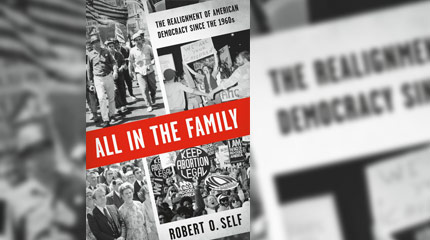Recently, the S-USIH blog has engaged in a lively exchange regarding Robert O. Self’s most recent book, All In the Family: The Realignment of American Democracy Since the 1960s (Hill and Wang, 2012). Self has recently written an essay in response to issues raised during this exchange, and in particular, to Christopher Shannon’s two posts related to Self’s book. Self teaches history at Brown University. He writes about American politics and social movements in the twentieth century and teaches a variety of courses on the same subject. His interests range widely and include the history of American cities and suburbs, the history of family, and the history of sex and sexuality in the twentieth century. He is also the co-author (with James Henretta and Rebecca Edwards) of a college-level textbook, America’s History. He lives in Providence, Rhode Island.
 Chris Ramsey first reviewed Self’s book for the blog. Ramsey is is a Ph.D. candidate in United States History at Loyola University of Chicago. His research interests focus on race, gender, and ethnicity in postwar urban America, and his dissertation (in progress) studies the evolution of white attitudes to racial attitudes on the Southwest Side of Chicago from the end of World War II through the election of Mayor Harold Washington in 1983.
Chris Ramsey first reviewed Self’s book for the blog. Ramsey is is a Ph.D. candidate in United States History at Loyola University of Chicago. His research interests focus on race, gender, and ethnicity in postwar urban America, and his dissertation (in progress) studies the evolution of white attitudes to racial attitudes on the Southwest Side of Chicago from the end of World War II through the election of Mayor Harold Washington in 1983.
 Christopher Shannon responded to Ramsey’s book review with one post and then, in an effort to clarify his specific critique of Self’s argument, with another post
Christopher Shannon responded to Ramsey’s book review with one post and then, in an effort to clarify his specific critique of Self’s argument, with another post
that directly engaged All in the Family and the set of assumptions that Shannon believes need to be contested. Shannon is the author of three books, including A World Made Safe for Differences: Cold War Intellectuals and the Politics of Identity (Roman and Littlefield, 2000). He is an associate professor of history at Christendom College in Virginia. Shannon recently won a fellowship to support research for his project titled “The Salvation of the Nations: Sacred and Secular Narratives of Progress in the Postwar West.” Shannon’s project is one of several funded through a major research initiative, “Religion and Innovation in Human Affairs,” sponsored by The Historical Society, an international scholarly organization based at Boston University. Over the course of the next two years, the fellowship funding will provide Shannon with release from a full teaching load in order to devote more time to the research and writing needed to turn the project into a book-length manuscript. Read more about it here.


3 Thoughts on this Post
S-USIH Comment Policy
We ask that those who participate in the discussions generated in the Comments section do so with the same decorum as they would in any other academic setting or context. Since the USIH bloggers write under our real names, we would prefer that our commenters also identify themselves by their real name. As our primary goal is to stimulate and engage in fruitful and productive discussion, ad hominem attacks (personal or professional), unnecessary insults, and/or mean-spiritedness have no place in the USIH Blog’s Comments section. Therefore, we reserve the right to remove any comments that contain any of the above and/or are not intended to further the discussion of the topic of the post. We welcome suggestions for corrections to any of our posts. As the official blog of the Society of US Intellectual History, we hope to foster a diverse community of scholars and readers who engage with one another in discussions of US intellectual history, broadly understood.
Pingback: Society for United States Intellectual History… | myrivercityblues
Pingback: Shannon Responds to Self | s-usih.dev
Pingback: An Emerging Historiography of the Culture Wars | s-usih.dev